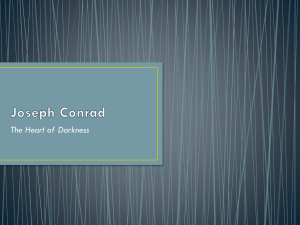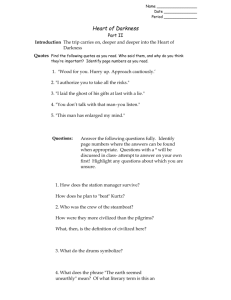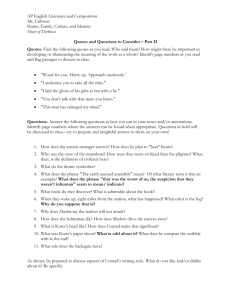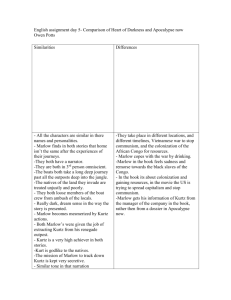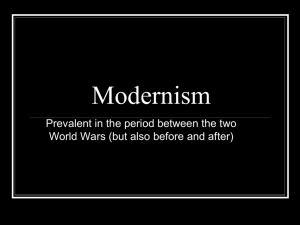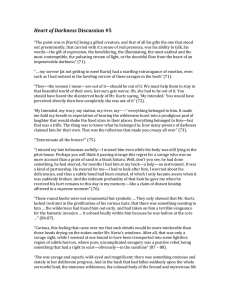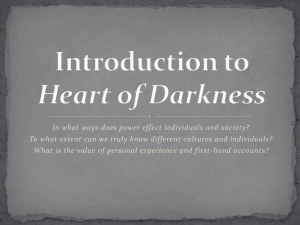Sample HOD 78-9
advertisement
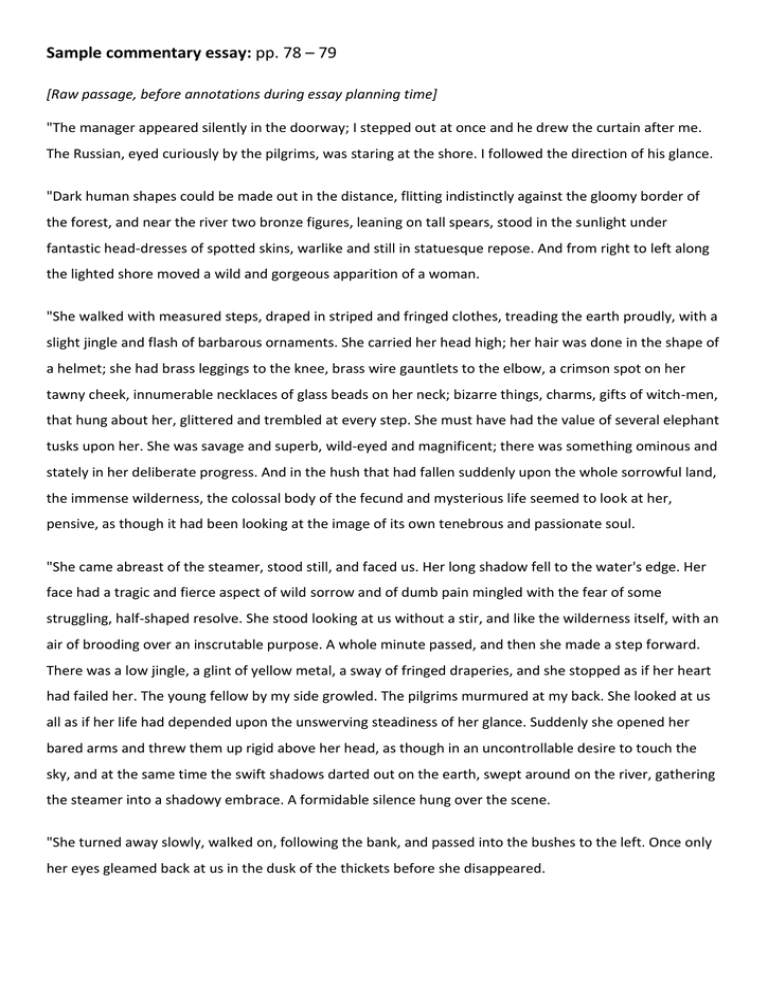
Sample commentary essay: pp. 78 – 79 [Raw passage, before annotations during essay planning time] "The manager appeared silently in the doorway; I stepped out at once and he drew the curtain after me. The Russian, eyed curiously by the pilgrims, was staring at the shore. I followed the direction of his glance. "Dark human shapes could be made out in the distance, flitting indistinctly against the gloomy border of the forest, and near the river two bronze figures, leaning on tall spears, stood in the sunlight under fantastic head-dresses of spotted skins, warlike and still in statuesque repose. And from right to left along the lighted shore moved a wild and gorgeous apparition of a woman. "She walked with measured steps, draped in striped and fringed clothes, treading the earth proudly, with a slight jingle and flash of barbarous ornaments. She carried her head high; her hair was done in the shape of a helmet; she had brass leggings to the knee, brass wire gauntlets to the elbow, a crimson spot on her tawny cheek, innumerable necklaces of glass beads on her neck; bizarre things, charms, gifts of witch-men, that hung about her, glittered and trembled at every step. She must have had the value of several elephant tusks upon her. She was savage and superb, wild-eyed and magnificent; there was something ominous and stately in her deliberate progress. And in the hush that had fallen suddenly upon the whole sorrowful land, the immense wilderness, the colossal body of the fecund and mysterious life seemed to look at her, pensive, as though it had been looking at the image of its own tenebrous and passionate soul. "She came abreast of the steamer, stood still, and faced us. Her long shadow fell to the water's edge. Her face had a tragic and fierce aspect of wild sorrow and of dumb pain mingled with the fear of some struggling, half-shaped resolve. She stood looking at us without a stir, and like the wilderness itself, with an air of brooding over an inscrutable purpose. A whole minute passed, and then she made a step forward. There was a low jingle, a glint of yellow metal, a sway of fringed draperies, and she stopped as if her heart had failed her. The young fellow by my side growled. The pilgrims murmured at my back. She looked at us all as if her life had depended upon the unswerving steadiness of her glance. Suddenly she opened her bared arms and threw them up rigid above her head, as though in an uncontrollable desire to touch the sky, and at the same time the swift shadows darted out on the earth, swept around on the river, gathering the steamer into a shadowy embrace. A formidable silence hung over the scene. "She turned away slowly, walked on, following the bank, and passed into the bushes to the left. Once only her eyes gleamed back at us in the dusk of the thickets before she disappeared. [Passage with my annotations, including aspects I used, and those I didn’t] nature imagery & personification dehumanization, exoticism & primitive description light and darkness other imagery interesting war imagery momentous diction antithesis, contrast, juxtaposition a) nature imagery and personification b) exotic, savage and inhuman description c) momentous diction "The manager appeared silently in the doorway; I stepped out at once and he drew the curtain after me. The Russian, eyed curiously by the pilgrims, was staring at the shore. I followed the direction of his glance. "Dark human shapes could be made out in the distance, flitting indistinctly against the gloomy border of the forest, and near the river two bronze figures, leaning on tall spears, stood in the sunlight under fantastic head-dresses of spotted skins, warlike and still in statuesque repose. And from right to left along the lighted shore moved a wild and gorgeous apparition of a woman. "She walked with measured steps, draped in striped and fringed clothes, treading the earth proudly, with a slight jingle and flash of barbarous ornaments. She carried her head high; her hair was done in the shape of a helmet; she had brass leggings to the knee, brass wire gauntlets to the elbow, a crimson spot on her tawny cheek, innumerable necklaces of glass beads on her neck; bizarre things, charms, gifts of witch-men, that hung about her, glittered and trembled at every step. She must have had the value of several elephant tusks upon her. She was savage and superb, wild-eyed and magnificent; there was something ominous and stately in her deliberate progress. And in the hush that had fallen suddenly upon the whole sorrowful land, the immense wilderness, the colossal body of the fecund and mysterious life seemed to look at her, pensive, as though it had been looking at the image of its own tenebrous and passionate soul. "She came abreast of the steamer, stood still, and faced us. Her long shadow fell to the water's edge. Her face had a tragic and fierce aspect of wild sorrow and of dumb pain mingled with the fear of some struggling, half-shaped resolve. She stood looking at us without a stir, and like the wilderness itself, with an air of brooding over an inscrutable purpose. A whole minute passed, and then she made a step forward. There was a low jingle, a glint of yellow metal, a sway of fringed draperies, and she stopped as if her heart had failed her. The young fellow by my side growled. The pilgrims murmured at my back. She looked at us all as if her life had depended upon the unswerving steadiness of her glance. Suddenly she opened her bared arms and threw them up rigid above her head, as though in an uncontrollable desire to touch the sky, and at the same time the swift shadows darted out on the earth, swept around on the river, gathering the steamer into a shadowy embrace. A formidable silence hung over the scene. "She turned away slowly, walked on, following the bank, and passed into the bushes to the left. Once only her eyes gleamed back at us in the dusk of the thickets before she disappeared. COMMENTARY: This passage occurs early in Chapter Three, when Marlow and his crew arrive at the inner station to return the moribund Kurtz to civilization. Marlow’s much-anticipated encounter with Kurtz has not yet occurred, although he has seen the man from a distance. As the Europeans approach Kurtz’s residence, the African warrior queen presumed to be Kurtz’s mistress makes an appearance. From a distance, she acknowledges the invasion of the white men, and Marlow describes the strong impression she makes upon him and the others. The tone of Marlow’s narration is a blend of admiration and deprecation of the scene before him, and through this contradiction, the passage exemplifies one of the fundamental ambiguities of the entire text: the formidable majesty of the African wilderness, and its corresponding savagery and dehumanizing effect upon civilized man. Nature, embodied by the warrior queen, is summoned up through elaborate description and personification, and its dual nature is developed through the savage, inhuman imagery and paradoxically momentous diction applied to the queen herself. The passage begins with African natives “flitting indistinctly against the gloomy border of the forest”: already, the forest is personified with a somber mood, and is blended inextricably with the natives who populate it (78). This is made more explicit when the land itself is characterized as a “sorrowful” . . . “body of the fecund and mysterious life,” which gazes at the chieftess thoughtfully, “as though it had been looking at the image of its own tenebrous and passionate soul.” Near the end of the passage, “swift shadows darted out on the earth, swept around on the river, gathering the steamer into a shadowy embrace” – here, it is unclear whether jungle shadows or actual natives are surrounding the boat, so intertwined are the two. The granting to the forest of emotional and largely negative human characteristics such as “gloomy,” “sorrowful,” “pensive,” and “passionate” signifies its rejection of the invading white men and their values, while at the same time the forest’s seamless mixing with its native residents both detracts from the Africans’ humanity, and confirms their inability to coexist peacefully or productively with the Europeans. As the forest draws “the steamer into a shadowy embrace,” Conrad suggests that the only possible outcome of the union between Europeans and Africa is the forceful dragging of the former into a dark and incomprehensible downfall (79). Just as the African forest is given human qualities, so the Africans and the queen in particular are stripped of their humanity, described repeatedly in savage, exotic, or inhuman terms. The tribesmen are “dark human shapes” or “bronze figures” instead of men; the queen is an “apparition of a woman” decked out in “barbarous ornaments” in place of the jewelry a European woman might wear. Indeed, these are not conventional jewels, but rather, “bizarre things” . . . “gifts of witch men,” though their “value of several elephant tusks” is acknowledged in such a way as to make the African woman more a commodity than a person, and like an object, she is “draped” instead of “dressed.” She, of course, is as “savage” and “ominous” as the deep African bush of the interior; although she is granted the feelings of “sorrow” and “pain,” these are “fierce,” “wild,” and “dumb,” more akin to an animal’s rudimentary sensations than complex human emotions. She never communicates, and the only noise attributed to her is the “low jingle” of her accoutrements, which in turn prompts a beast-like growl from the Russian trader. Before she departs, she adopts an inexplicable posture that, to Marlow, shows her “uncontrollable desire to touch the sky,” and once she retreats into the wilderness from whence she has emerged, Marlow sees “her eyes gleam[ing] back” . . . “in the dusk of the thickets,” like the gaze of a puma as it observes its prey (79). Conrad’s portrayal of the African woman as object or animal instead of person reveals that in some senses, the warrior queen is little more to Marlow than a gaudily colored specimen of Congolese fauna, rendering Kurtz’s unmentioned union with her a particularly potent element of his descent into darkness. Despite his heavyhanded dehumanization of the African woman, Marlow’s detailed illustration of her is by no means a one-sided condemnation of her substance. While she may not be human in any sense that Marlow can relate to, the noble, momentous diction he uses to convey her essence to his audience shows that she holds him in her thrall in much the same way that Kurtz has during the journey upriver. She is not merely still, but rests “in statuesque repose” (78), and when she does move, she does so “with measured steps,” “treading the earth proudly” with “her head high.” Though savage, she is “superb” and “stately,” making “deliberate progress” rather than wild movements, and her mere presence causes a “hush” to fall among all of the onlookers. She casts a “long shadow” and is “like the wilderness itself, with an air of brooding over an inscrutable purpose” (79). Hers is not a senseless, arbitrary existence – however, Marlow is incapable of comprehending the purpose that she, like the African continent, represents. His deferential diction throughout the passage verifies that he is aware of her power and, even as he is repulsed by it, it seems to hold for him a certain allure. Although it seems at first glance to be a relatively simple descriptive passage, this fragment of Chapter Three reveals the complex and contradictory treatment of Africa that runs through much of Heart of Darkness. Conrad combines Africa and Africans by personifying the wilderness and dehumanizing the natives, and his assessment of both is by turns dark and condemnatory, then laudatory and enthralled. The warrior queen conjures up something prehistoric, threatening, and yet elemental that Marlow struggles and ultimately fails to understand; afterward, he believes that he is somehow worse off for the attempt, having succumbed to a dangerous, primitive seduction. Herein lies an essential impediment to the interpretation of Heart of Darkness: the warrior queen and Africa possess nobility, strength, purpose, and an apparent lack of the hypocrisy and empty greed that Marlow so despises, yet his attraction to them is a sign of the same weakness and darkness that drew Kurtz in and devoured him.

